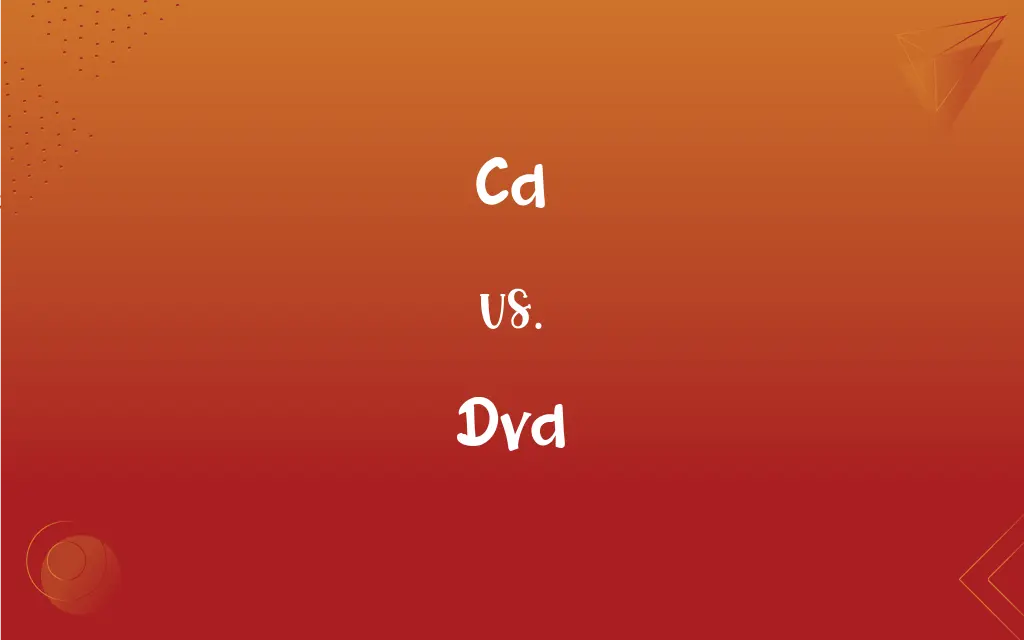CD vs. DVD: What's the Difference?
Edited by Janet White || By Harlon Moss || Updated on October 4, 2023
CD (Compact Disc) primarily stores audio, while DVD (Digital Versatile Disc) offers larger storage capacity suitable for video and data.

Key Differences
CD and DVD are both optical storage media, but they serve slightly different purposes and have distinct characteristics. CDs, or Compact Discs, were introduced in the 1980s mainly for audio storage. They revolutionized the music industry, allowing for clearer sound quality and more compact physical storage than cassette tapes. DVDs, or Digital Versatile Discs, came later and offered a significant advancement in terms of storage capacity, making them ideal for video content, software, and more.
The physical appearance of CDs and DVDs is quite similar, with both being round, shiny discs. However, the underlying technology and the data density differ. DVDs can store more information due to smaller pits and tighter tracks compared to CDs.
CDs primarily found their niche in the music industry, while DVDs became synonymous with movies and larger software applications. Though both can store various forms of data, the larger capacity of DVDs made them more versatile for diverse content.
Over time, as digital storage and streaming technologies evolved, the prominence of both CDs and DVDs has diminished. Yet, they remain iconic examples of the shift from analog to digital storage in the late 20th century.
Comparison Chart
Full Form
Compact Disc
Digital Versatile Disc
ADVERTISEMENT
Introduced
1980s
1990s
Primary Use
Audio storage
Video, software, and data storage
Storage
Typically up to 700MB
4.7GB (single layer) to 17GB (double layer)
Data Density
Lower data density
Higher data density due to smaller pits
CD and DVD Definitions
Cd
CD is an optical disc used for storing audio.
He bought the latest album on CD.
ADVERTISEMENT
Dvd
DVD is an optical storage medium with high capacity.
The movie is available on DVD.
Cd
CD revolutionized music in the 1980s.
The CD collection at the store was impressive.
Dvd
DVD can store both video and data content.
The software installation DVD is in the box.
Cd
CD players use lasers to read data.
Her car still has a CD player.
Dvd
DVD quality transformed home entertainment.
DVDs offer clear visuals and sound.
Cd
CD has a typical storage limit of 700MB.
The software was too large to fit on a CD.
Dvd
DVD storage capacity exceeds that of CDs.
This game is available only on DVD due to its size.
Cd
CD became a replacement for cassette tapes.
She replaced her old tapes with CDs.
Dvd
DVD players became a staple in households.
Let's watch it on the DVD player tonight.
Cd
The chemical suymbol for cadmium, a metallic element of atomic number 48.
Dvd
A high-density optical disc for storing large amounts of data, especially high-resolution audio-visual material.
Cd
The abbreviation for the candela, the basic unit of luminous intensity adopted under the System International d'Unites.
Dvd
A digital videodisc; a recording (as of a movie) on an optical disk that can be played on a computer or a television set
Cd
An acronym for compact disk, a disk-shaped recording of binary data that is smaller than a phonograph record, and is recorded and played back by a compact disk player, an electronic device containing a laser. The term is also used generically to refer to the medium as a data storage medium.
Cd
A compact disk player.
FAQs
Which has a larger storage capacity, CD or DVD?
DVD typically has a larger storage capacity than CD.
What's the primary use of a DVD?
The primary use of a DVD is for storing video, software, and data.
When were CDs introduced?
CDs were introduced in the 1980s.
Can I play a DVD in a CD player?
No, DVDs require a DVD player or a computer with DVD-reading capabilities.
What does CD stand for?
CD stands for Compact Disc.
Do DVDs come in different storage capacities?
Yes, DVDs range from 4.7GB (single layer) to 17GB (double layer).
Are there alternatives to CDs and DVDs in the current market?
Yes, Blu-ray discs, USB drives, and cloud storage are among the modern alternatives.
Are CDs and DVDs the same size physically?
Yes, they're both typically 12 cm in diameter, but their data density and capacity differ.
Can CDs store video content?
While CDs can store video, they're limited in capacity compared to DVDs.
Are CDs and DVDs still popular?
Their popularity has waned due to digital streaming and storage, but they're still used.
How did CDs impact the music industry?
CDs offered clearer sound and compact storage, revolutionizing music distribution.
Why are DVDs suitable for movies?
DVDs have a larger storage capacity, making them ideal for lengthy video content.
Were DVDs an immediate successor to CDs?
While DVDs followed CDs, they were more of a complement, focusing on video and larger data storage.
Can I store my own data on CDs and DVDs?
Yes, using CD/DVD burners, you can store personal data on writable discs.
Are CDs and DVDs prone to scratches?
Yes, both can be scratched, which might impair their readability.
Can a DVD hold software applications?
Yes, many software applications are distributed on DVDs because of their larger size.
Is there a difference in appearance between CDs and DVDs?
Physically, they're quite similar, but the data density and storage capacity differ.
How much data can a standard CD hold?
A standard CD can hold up to 700MB of data.
Which provides better video quality, CD or DVD?
DVD provides superior video quality due to its higher storage capacity.
How do CD and DVD players read data?
Both use lasers to read data from the disc's surface.
About Author
Written by
Harlon MossHarlon is a seasoned quality moderator and accomplished content writer for Difference Wiki. An alumnus of the prestigious University of California, he earned his degree in Computer Science. Leveraging his academic background, Harlon brings a meticulous and informed perspective to his work, ensuring content accuracy and excellence.
Edited by
Janet WhiteJanet White has been an esteemed writer and blogger for Difference Wiki. Holding a Master's degree in Science and Medical Journalism from the prestigious Boston University, she has consistently demonstrated her expertise and passion for her field. When she's not immersed in her work, Janet relishes her time exercising, delving into a good book, and cherishing moments with friends and family.































































